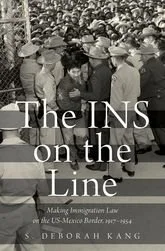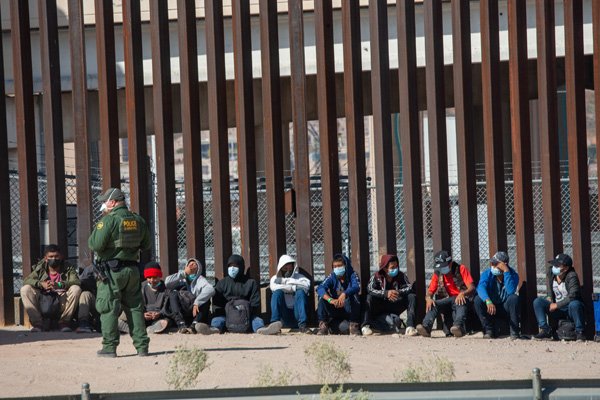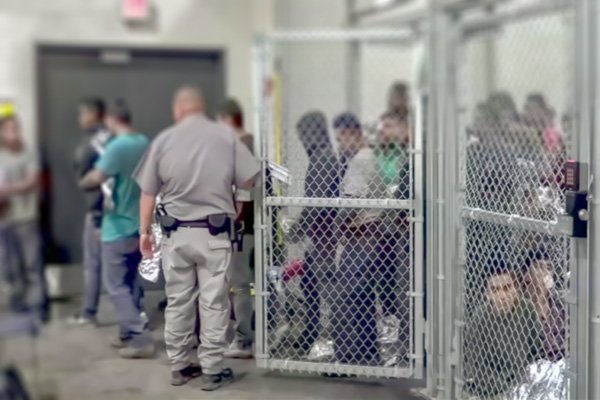Criminal Laws
In 1929, Congress set out to punish — and exploit — Mexican migrants. That shameful legacy remains.
Read
Entering the United States without permission is a crime. But should it be?
This time on the show, we hear from a couple of lawyers who have been fighting to decriminalize unauthorized immigration. They say federal law unfairly targets Latin Americans — locking up hundreds of thousands of migrants who cross America’s southern border, costing billions of dollars each year. Plus, Will speaks with University of Virginia historian Debbie Kang, who has helped make the case that those laws have patently racist origins.
Kang layers an economic story over the sordid tale of xenophobia, and tells Will why the legal efforts of public defenders Kara Hartzler and Lauren Gorman could prove to be a watershed moment in immigration history: perhaps as important as Brown v. Board of Education was to the U.S. civil rights movement.
Meet
Kara Hartzler is an appellate attorney with the Federal Defenders of San Diego. She holds a J.D. from the University of Iowa. Previously, Hartzler served as legal director of the Florence Immigrant and Refugee Rights Project in Arizona. She publishes resources for defense attorneys and has taught at the University of Arizona College of Law. Hartzler has also testified before Congress on immigration issues, served as an electoral observer in El Salvador, and participated in a humanitarian delegation to Iraq. Follow her on Twitter @KaraHartzler.
Lauren Gorman is the daughter of two immigrants. She grew up largely in San Diego and holds a law degree from Stanford University, where she was a Class of 2009 Public Interest Fellow. She moved to Reno after graduating from law school, where she clerked for U.S. Judge Edward C. Reed of the District of Nevada. Gorman has served as an assistant federal public defender for over a decade but recently left that position to work in a new role in public service.
S. Deborah Kang is an associate professor of history at the University of Virginia and a member of UVA’s Democracy Initiative, which supports this show. She is the author of The INS on the Line: Making Immigration law on the US-Mexico Border, 1917-1954 (Oxford University Press, 2017). Kang’s second book will be a history of U.S. immigration policies from the early 20th century to the present. Kang advises federal public defenders and, formerly, served as a fellow at the U.S. Immigration Policy Center of the University of California–San Diego. Follow Kang on Twitter @kangborderlaw.
In her first book, The INS on the Line, Kang shows how border policy has been motivated by nativism as much as security concerns.
Her research has helped to challenge sections 1325 and 1326 of U.S. Title 8, the laws that provide for criminal penalties for migrants who enter and reenter the United States without papers. She recently filed an affidavit in several federal courts on the racial animus behind the original codification of these laws, and their subsequent reenactments.
Hartzler is the author of the self-published Surviving Padilla: A Defender’s Guide to Advising Noncitizens on the Immigration Consequences of Criminal Convictions.
She is also a playwright. First commissioned by Borderlands Theater in Tucson, Arizona, Hartzler’s No Roosters in the Desert is based on fieldwork by Anna Ochoa O’Leary and tells the story of four women who risk everything to cross the U.S.-Mexico border.
Gorman successfully challenged Section 1326 in federal court in Nevada, but the Biden administration’s Department of Justice has appealed. Read Gorman’s answering brief for her former client in U.S. v. Carrillo-López. The case is likely to land before the Supreme Court.
Learn
On August 18, 2021, U.S. District Judge Miranda Du dismissed the government’s indictment of Carrillo-López under Section 1326. She agreed with his attorneys that the law “was enacted with a discriminatory purpose.”
Writing for Public Books, Torrie Hester explains how a 2020 Supreme Court decision — one supported by conservative justices — opened the way to challenging immigration laws on the basis of racial discrimination.
Eric S. Fish goes deep on the racist origins of the Undesirable Aliens Act of 1929, the law that first to criminalized unlawful border crossings.
In City of Inmates: Conquest, Rebellion, and the Rise of Human Caging in Los Angeles, historian Kelly Lytle Hernández recounts the history of mass incarceration in southern California and the xenophobia that fueled it.
Operation Streamline is a system that fast-tracks the prosecution of as many as 70 migrants daily. Many legal scholars say the process doesn’t provide defendants adequate representation.
The criminalization of immigration affects not only the undocumented. Over the past two decades, hundreds of thousands of U.S. residents have been deported for minor, nonviolent offenses. One factor in this situation is that a number of loopholes in federal law deny lawful immigrants the same basic legal protections afforded to citizens.
The Biden administration has been trying to end two Trump-era policies on immigration. One requires asylum seekers to remain in Mexico while awaiting a hearing on their claims. The other, known as Title 42, is a covid-era order allowing border agents to immediately deport detainees on public health grounds. Republican-led states like Texas have sued to block Biden from ending Title 42.
The day he took office, President Biden issued an executive order ending Trump’s “Muslim ban,” saying it unfairly targeted immigrants of color.
Biden has also reduced funding for immigration detention, cut ties with some detention facilities and ended the practice of arresting entire families caught crossing the border.
Proposals supported by Democrats that would reform U.S. immigration law have not gone very far in the face of GOP opposition.
Regular listeners will know this issue is important to us. We’ve covered immigration and its relationship to democratic ideals in past episodes with historian Erika Lee, political scientist Elizabeth Cohen and legal scholar Amanda Frost. That last show also features the personal stories of two so-called Dreamers — undocumented Americans who came to the United States as children.
Heard on the show
Joe Biden made an appearance this time, with audio clipped from his address to Congress on April 28, 2021. You’ll also hear portions of news reports on border policy, from MSNBC and CBS News.
We scored our piece about Hartzler’s and Gorman’s work with two tracks off the 2016 Ketsa album Universal Law: “Rain Stops” and “Sorrow the Sun”; plus two more tunes — “Hanging Rock” and “Delving the Deep” — from a new collection by Blue Dot Sessions, called Sour Mash. The transition music that follows the piece is John Bartmann’s “Smooth Criminal.”
















